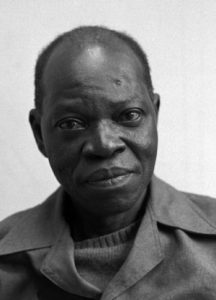
Amos Tutuola
*Amos Tutuola was born on this date in 1920. He was a Black Nigerian writer.
Amos Tutuola was born Olatubosun Odegbami in Wasinmi, a village just a few miles outside Abeokuta, Nigeria. His parents, Charles Tutuola Odegbami and Esther Aina Odegbami were Yoruba Christian cocoa farmers. He was the youngest son of his father, and his mother was his father's third wife. His grandfather, the Odafin of Egbaland, Chief Odegbami was a patriarch of the Odegbami clan, a chieftain of the Egba people, and a traditional worshipper of the Yoruba religion. His title "Odafin" signified that he had an administrative position within the traditional administration of the Egbaland and was one of the Iwarefa of the Ogboni.
When he was seven years old, in 1927, Amos became a servant for F. O. Monu, an Igbo man, who sent him to the Salvation Army primary school instead of wages. At age 12, he attended the Anglican Central School in Abeokuta. His brief education was limited to six years (from 1934 to 1939). After his grandfather died in 1936, most family members adopted the European naming style and took his name, Odegbami, as their last name. However, many family members, like Amos, decided to take their father's name, Tutuola. That is how his last name became Tutuola. When his father died in 1939, Tutuola left school to train as a blacksmith, the trade he practiced for three years for the Royal Air Force in Nigeria during WWII. He subsequently tried several other vocations, including selling bread and acting as a messenger for the Nigerian Department of Labor.
In 1946, Tutuola completed his first full-length book, The Palm-Wine Drinkard, within a few days. In 1947 he married Victoria Alake, with whom he had four sons and four daughters. However, he also married three other wives. Despite his short formal education, Tutuola wrote his novels in English. In 1956, after he had written his first three books and become internationally well-known, he joined the Nigerian Broadcasting Corporation in Ibadan, Western Nigeria as a storekeeper. Tutuola also became one of the founders of the Mbari Club, the writers' and publishers' organization. In 1979, he held a visiting research fellowship at the University of Ife (now Obafemi Awolowo University) at Ile-Ife, Nigeria, and in 1983 he was an associate of the International Writing Program at the University of Iowa. In retirement, he divided his time between the residences in Ibadan and Ago-Odo.
Amos Tutuola died at 76 on June 8, 1997, from hypertension and diabetes. Many of his papers, letters, and holographic manuscripts have been collected at the Harry Ransom Humanities Research Center at the University of Texas, Austin. Tutuola, who wrote books based partly on Yoruba folktales, has works translated into 11 languages, including French, German, Russian, and Polish. Some translators, notably Raymond Queneau (French) and Ernestyna Skurjat (Polish), deliberately adjusted the grammar and syntax of the translations to reflect the occasionally atypical language of Tutuola's original prose. In 2015, the Society of Young Nigerian Writers, under the leadership of Wole Adedoyin, founded the Amos Tutuola Literary Society, aimed at promoting and reading the works of Amos Tutuola.
The video game Vendetta: the Curse of Raven's Cry, which takes place in the 17th-century Caribbean archipelago, includes a side storyline concerning a self-liberated and self-governing clan of African Maroons, whose spiritual guide and medicine man is named Tutuola. Writer Jaromir Król confirmed that the name was a deliberate homage to Amos Tutuola; he considered the Nigerian author's stories astonishing and unforgettable since he had first read them at age 6, and felt that the thoughtful, philosophical and noble character was worthy of being given Amos Tutuola's name.